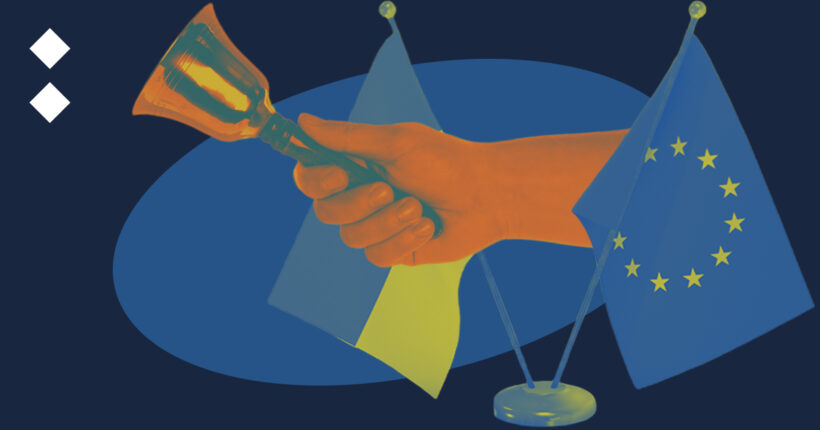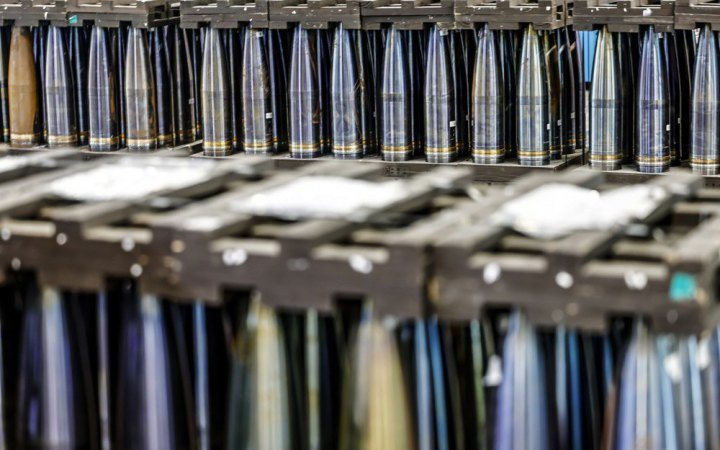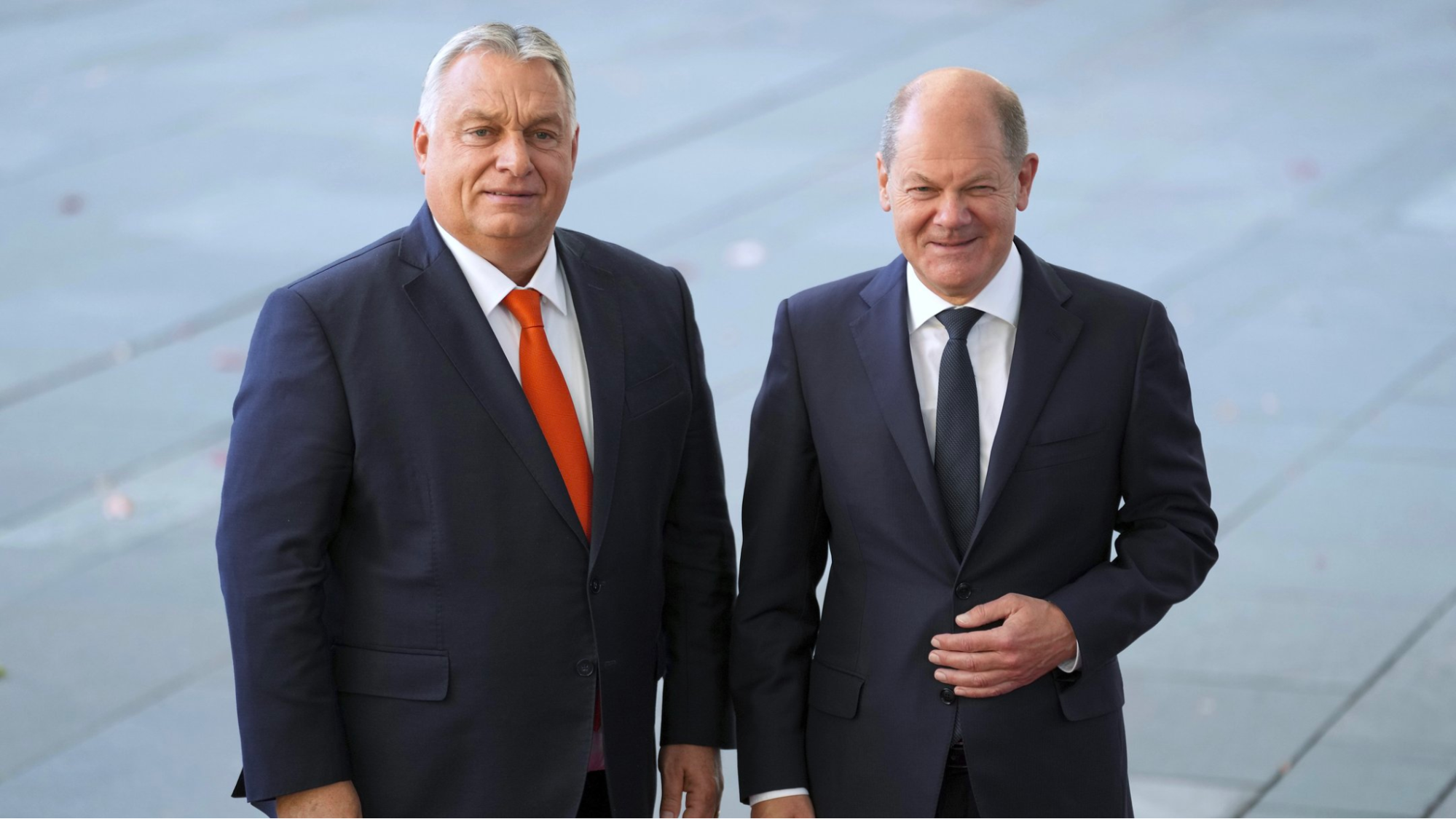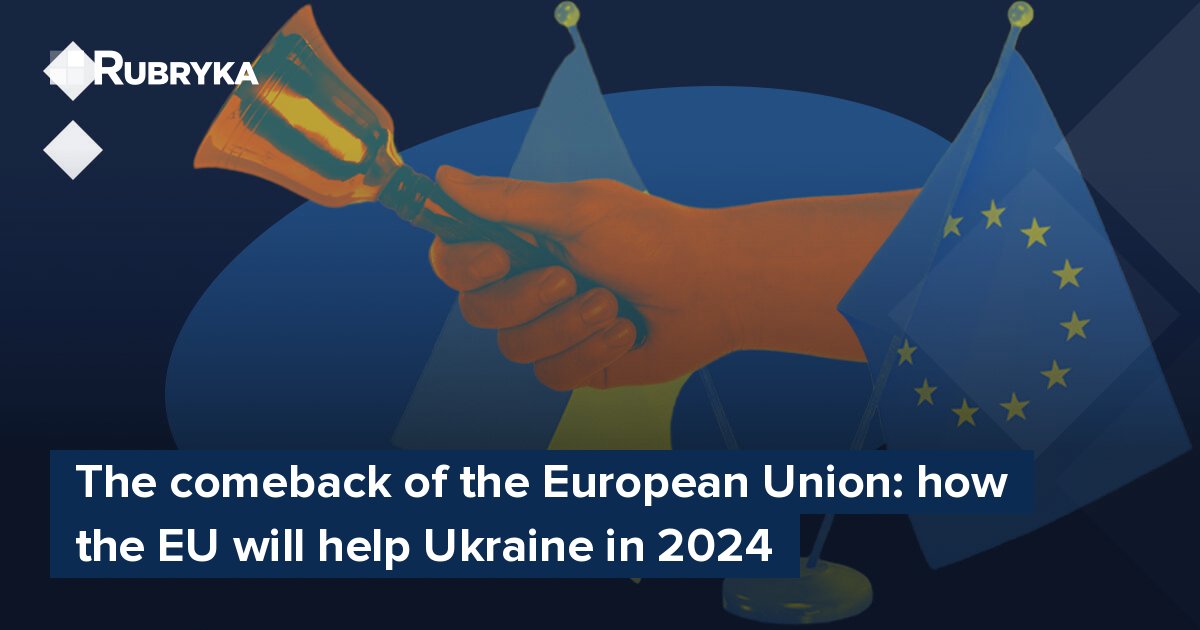
In recent months, only a lazy person did not write that the allies are turning away from Ukraine. This is not surprising because the US still cannot pass a new package of military aid, and the European Union has not yet provided Ukraine with the promised €50 billion — this financial support will stretch over four years.
However, in 2024, the European Union and its member states are already showing they are ready to continue helping Ukraine and are building new plans. Of course, compared to 2022, the allies are noticeably less optimistic, but Ukrainians can still count on their support.
Why the EU helps Ukraine and will not stop
So far, the most tangible difference between the EU and the US is that Ukraine remains the #1 foreign policy topic for the former. Of course, geography also plays a role because it is almost 7,000 kilometers from the US to Ukraine when the European Union has a war on its borders and a constant risk that the Russian Federation may attack the EU, at least in a hybrid format, and not with tanks.
Russian missiles and Shahed drones, from time to time, fly into the territory of the bloc, reminding the member states of the danger.
"Ukraine is the first item on the agenda. The fact that we are involved in finding a solution in the Middle East does not mean that we do not continue to support Ukraine… Ukraine needs more and faster military support now, so 2024 is the year of Ukraine's victory," said Josep Borrell, head of EU diplomacy.
One should not underestimate the fact that in Brussels, Ukrainians are considered a part of Europe. The Revolution of Dignity helped a lot in this case when Ukraine got into the EU's spotlight. And, of course, the Russian invasion had an effect, which prompted Europeans to define Ukraine as the West and Russia as not, as opposed to the ideas when there was a slight difference for Europeans between Ukrainian and Russian cities, which they considered in general as Eastern Europe.
"History is now calling us to work on completing our Union. In a world where some are trying to pick off countries one by one, we cannot afford to leave our fellow Europeans behind," said Ursula von der Leyen, head of the European Commission.
If you like, this is the EU version of Ukraine's idea of unity: all Europeans should unite under the blue-starred flag. By the way, the European Commission is already preparing a negotiation framework, a document with the terms of Ukraine's accession. However, many years of work are ahead, and Ukraine will not be accepted without fulfilling all the conditions.
In general, Ursula von der Leyen is not only one of Ukraine's main allies in the West. She also supports the idea of a "geopolitical [European] Commission" when the EU defends its interests in the international arena on an equal footing with the US or China and does not deal only with the economy.
Supporting Ukraine fits nicely into this strategy. Ukraine's victory will restrain the Russian Federation, and it is more profitable for the European Union to have an ally country with a strong military-industrial complex nearby and not a gray zone like the Balkans in the 90s or Russian military bases near Lutsk and Lviv.
Especially when Europeans increasingly believe that Russia is capable of attacking them. Western experts are already discussing where and when they will have to fight. Thus, the German Council on International Relations believes that the Russian Federation needs six to ten years to prepare for aggression against the EU, but the Russians may not attack if they lose in Ukraine. The Bild newspaper, referring to one of the intelligence sources, wrote about the next winter, and Estonian Prime Minister Kaja Kallas spoke about three to five years to prepare for a new threat.
It seems that the idea of "help Ukraine, or Putin will attack" is becoming one of the arguments for officials in Brussels and the governments of the EU states.
To summarize, there is no reason to believe that Ukraine's support from the European Commission, the majority of member states, and the European Parliament is critically decreasing compared to 2022. It is enough to mention that 512 out of 705 members of parliament voted for €50 billion for Ukraine. Only Hungary is blocking aid, using the right of veto.
Accordingly, Ukrainians can continue to count on the support of the European Union and its member states: money, weapons, and diplomatic efforts.
However, there are still issues that need to be addressed

Production of 155-mm artillery shells at the Rheinmetall plant, Germany. Photo: EPA/UPG
The most obvious reason not to idealize the situation is the frozen conflict with Poland over grain export and cargo transportation. It must be resolved quickly to prevent new border blockades. And let's quote the head of Ukraine's intelligence, Kyrylo Budanov: Western sanctions are (still) not enough and must be strengthened.
Meanwhile, the European Union is still lagging behind its plan to provide Ukraine with a million projectiles (although a separate law on their production was adopted), and the reason lies precisely in the human factor. According to one version, the governments simply did not order enough ammunition, and according to another, the problem lies with companies that sell shells to third countries, not to Ukraine.
But even when the mechanism is fully operational, one should not expect the partners to remove all restrictions: Germany still refuses to provide Ukraine with Taurus missiles.
There are many more factors, such as the populist Slovak PM Robert Fico (with whom it is still possible to negotiate), a possible far-right government in the Netherlands (it is not known whether they will support aid from the EU and Ukraine's entry into EU) and the upcoming elections in Austria — there, FPÖ party, which generally opposes sanctions and shifts the blame from the Russian Federation to the USA and the European Union, is in the lead.
Now, the main task is to unlock €50 billion

Chancellor of Germany Olaf Scholz and Prime Minister of Hungary Viktor Orban. Photo: AP
The European Union promised Ukraine this sum in June, but at that time, little attention was paid to it because the public was more interested in Abrams, Bradley, ATACMS, and other weapons to knock out the Russians. EU aid, meanwhile, can only go to civilian needs.
Strategically, Ukraine needs it to keep the economy afloat. A year ago, the government estimated the war's losses to be more than $700 billion. The government can direct more money to the army if the European Union helps pay salaries and pensions. Otherwise, there will be an economic crisis, delays in payments, and other things that will seriously weaken Ukraine.
The problem is that Ukraine will receive this money as part of the EU budget, which is approved by the European Council. It must vote unanimously, which means that Hungary can block the process.
To the credit of European governments and the European Commission, they promise to somehow bypass the veto and provide Ukraine with money. The next EU summit will be held on February 1. Details about the negotiations are scarce, but according to Politico and the Financial Times, EU leaders are serious about convincing Hungarian PM Viktor Orban.
If Hungary does not give in, a group of states is allegedly ready to declare that Budapest will no longer receive money from the European Union, as they are also supposed to be allocated by unanimous vote. According to the Council of the EU assessment, this is a serious threat because investors will get scared, and Hungary will experience inflation and economic problems.
Before that, unnamed diplomats of the European Union discussed the idea of imposing sanctions on Hungary for problems with the rule of law — then, the veto power would be taken away from Budapest altogether — the European Parliament is also calling for it. Such pressure gives chances to convince Orban.
The motivation of the Hungarian PM is more complicated than simply working for Putin. So, the EU has blocked €30 billion for Hungary for violating the rules of the European Union, and Orban is determined to get them. In December, he stated directly that Hungary should first "receive all its funds" and only after that can come aid to Ukraine.
But for this, Hungarians need working relations with the rest of the European Union. Budapest also wants to be friends with European conservatives like Giorgia Meloni, which also requires respectability. Therefore, if other countries continue pressure, and there are no allies, Orbán threatens everyone but gives way. We recall the December summit when the Hungarian PM went to get coffee during the vote, allowing the rest of the EU to start accession negotiations with Ukraine.
This is precisely our situation because Ukraine would even cooperate with Slovak PM Robert Fico if he supported the €50 billion package. The head of the Ministry of Foreign Affairs of Finland, Elina Vaitonen, says she heard a "positive signal" from the Hungarians. Just in case, the Europeans already have a plan B when Ukraine is given money to bypass the EU budget: the member states will do it with their own money. In short, Ukraine will not remain without finances.
Brussels even takes on the uncharacteristic function of an arms dealer because the European Union promises to pay for producing 54 CAESAR self-propelled guns — France and Ukraine will buy another 12 each. They also announced a special fund for purchasing weapons and ammunition, in which the Europeans will invest five billion euros per year and promise to transfer the promised million shells. However, you have to wait for the results to assess how it will work.
Elections in the EU will not harm Ukraine, but it has its own tasks
2024 will also be a decisive year for the European Union because, in June, citizens will elect new European Parliament members, forming a new European Commission. There is a lot of hype surrounding these voters because of predictions about the rise of the far-right and almost the "end of Europe."
But so far, the numbers indicate that their impact on Ukraine will be less severe than it seems.
So, according to European sociologists, the center-right European People's Party (EPP), which is friendly to Ukraine, will win the elections again, so it will form a coalition. Their partners — the Social Democrats and the liberal Renew Europe bloc — will get fewer votes, but they will have enough mandates (391) to repeat the current coalition (361 votes are needed). By the way, this leaves Ursula von der Leyen with a good chance of running for a second term because she represents the EPP.

The estimated changes in the European Parliament.
Of course, the European Parliament also has the far-right group Identity and Democracy, formed by Eurosceptic and pro-Russian parties such as the Alternative for Germany or the Dutch Party for Freedom. For these reasons, Ukraine calls it a threat. According to forecasts, the group will have 87 mandates and be in third place.
Indeed, this is a very symbolic moment for the bloc — because the far-right is overtaking the greens, and the liberals and observers are now worried about what will happen to environmental protection. Of course, the influence of Orban, the ideological leader of radical Eurosceptics, will grow. But this is still far from the announced "ultra-right takeover of the European Union."
So far, there are no signs that Identity and Democracy will be invited to any coalition. After all, one of the pillars of the European People's Party is the German Christian Democrats, and for them, friendship with the far-right is taboo for understandable historical reasons. Another group of members of the EPP will be elected from the Polish Civic Platform of Donald Tusk, and they are also unlikely to get into the block with Identity and Democracy because this party relies on liberal voters at home. So, the ultra-right will occupy the niche of serious opposition for the time being.
Of course, there are still risks involved. Currently, the most controversial topic in the European Parliament is the so-called Green Deal because the leftists put nature first, while for the rightists, the interests of farmers and businesses are more important.
If, after the elections, the EPP, social democrats, and liberals do not quickly agree on the climate or are forced to win votes at the expense of the greens or conservatives, the coalition may drag on due to ideological disputes, and this will distract the EU from supporting Ukraine.
But this process does not depend on Ukraine. Therefore, Ukraine should focus on its homework: implementing EU requirements for a candidate country and also working with European elites and citizens so that they continue to support Ukraine in the future.





